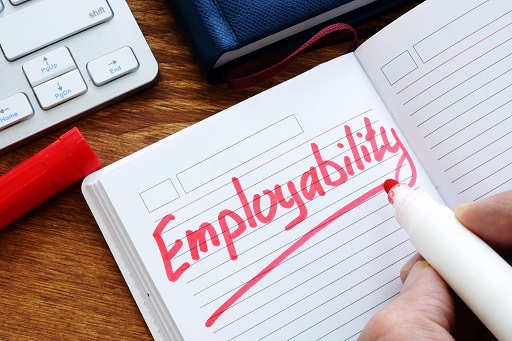5 Making yourself more employable
Another way that your skills relate to career resilience is the role they play in making you more employable. The more employable you are – the greater your career resilience.
You might have heard employability skills referred to as ‘transferable’ skills, and this is because you can develop them in one environment and transfer them to another, for example when changing jobs. It is your skills, strengths, knowledge and experience that make you attractive to future employers.
So, being aware of the skills you have, and knowing how you plan to develop them further, is a strong element of career resilience.
Increasingly, you’ll hear employers refer to strengths during recruitment and in the workplace. A strength is a skill that you have that you enjoy using, use often, and demonstrate across a range of different parts of your life. For example, you might have strong skills in written communication – you enjoy writing reports at work, write short stories in your spare time, and your friends and family often call on you to help them with tricky emails, or poems for a special occasion. Writing is one of your strengths.
Identifying your skills and strengths helps you to build your career resilience in a number of ways:
- it can help you to build a strong career narrative to share with your wider network and potential employers
- it can boost your self-esteem
- matching your skills with a range of job roles can broaden your awareness of the opportunities available to you
- knowing what you have to offer can make you more confident in volunteering for new projects or responsibilities – enhancing your job satisfaction and personal development.
Activity 6 Mapping your skills and strengths
Spend some time listing your employability skills – they could be skills you use at work or in your home life, hobbies or voluntary activities. If you need some inspiration, the University of Kent careers website includes a list of skills commonly looked for by graduate recruiters.
University of Kent – Employability skills [Tip: hold Ctrl and click a link to open it in a new tab. (Hide tip)] (open in a new tab/window)
Now look through your list, and try to identify those that you think might be strengths. If you need some help, think about how time passes when you are using a particular skill. If it flies by without you noticing because you are so absorbed in your task, that’s known as ‘flow’ and means it is likely to be a strength.
Make a list of your strengths. This will be much shorter than your list of skills. We all have things we’re good at that we don’t particularly enjoy – these are skills and not strengths.
Discussion
Now you have a list of your skills and strengths. This will be useful when assessing and applying for future job roles, but also when reviewing your current personal development needs, or when taking on new responsibilities in your current workplace.
If you feel that your list is too short, think about how you can develop your skills and strengths further. You could also ask people who know you well what they think your skills and strengths are – you might gain some unexpected insight that you can add to your list.

